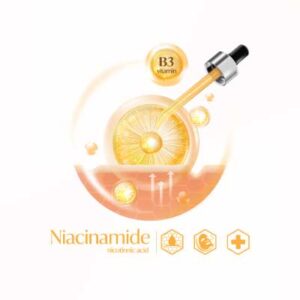
Our skin is constantly exposed to various environmental factors such as ultraviolet (UV) rays, smoking, heat, and air pollution. These elements generate harmful free radicals in the body, which damage skin cells and accelerate the aging process.
As skin ages, it loses hyaluronic acid, collagen, and elastin, leading to issues like dryness, roughness, dullness, reduced elasticity, uneven marks, and wrinkles, especially on the face and neck. On the other hand, UV exposure increases melanin production, resulting in uneven pigmentation, age spots, freckles, and melasma.
Research indicates that neutralizing free radicals and boosting the antioxidant capacity of cells with topical antioxidants can help maintain skin homeostasis. Niacinamide is one such powerful antioxidant that has been used in the cosmetic industry for decades to prevent skin aging and brighten skin tone.
Let’s delve deeper to know what niacinamide is and discover the remarkable benefits it offers for healthy and glowing skin.
Article contents
- What is Niacinamide?
- What are the benefits of Niacinamide for the skin?
- How do you incorporate Niacinamide into your daily skincare routine?
- Conclusion
- Frequently Asked Questions (FAQs)
What is Niacinamide?
Niacinamide, also known as Vitamin B3, is a small, water-soluble vitamin crucial for various metabolic functions in the human body. This vitamin exists in two water-soluble forms: niacin (or nicotinic acid) and niacinamide (or nicotinamide), vital for numerous physiological processes. Since these forms are not stored in the human body, they are obtained from dietary sources.
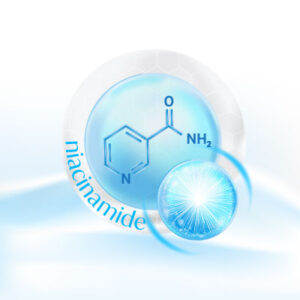
Niacin absorbed through the diet is converted into niacinamide within the body. High oral doses of niacin can cause adverse effects such as flushing (especially on the face and neck) and itching. In contrast, niacinamide is well-tolerated by the skin, causing no irritation, redness, burning, stinging, or itching. Therefore, niacinamide is the preferred form for cosmetic applications.
What are the benefits of Niacinamide for the skin?
Niacinamide is a crucial ingredient in many skincare products and cosmetics, playing a key role in NAD+ synthesis, redox reactions, and energy production in skin cells. It aids in DNA repair and cellular stress responses through various mechanisms. Its potent antioxidant properties make it a popular choice in cosmetic formulations.
Here are some remarkable benefits of niacinamide for your skincare routine:
1. Prevents Skin Aging:
Niacinamide, as a precursor of NAD/NADP, stimulates the synthesis of collagen, keratin, filaggrin, and involucrin. An increase in these proteins improves skin elasticity, epidermal barrier function, and moisture levels, reducing signs of aging like fine lines, wrinkles, poor texture, age spots, and yellowing.
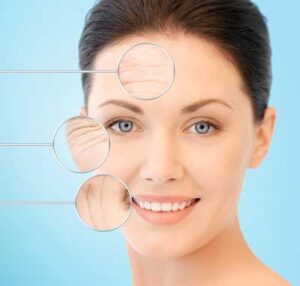
2. Reduces Hyperpigmentation:
Niacinamide can help decrease hyperpigmentation and age-related pigmented spots. Clinical studies have shown significant lightening of hyperpigmentation after eight weeks of treatment with niacinamide.
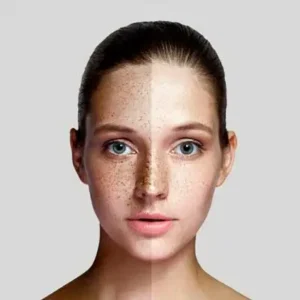
3. Alleviates Mild to Moderate Acne:
Niacinamide helps regulate sebum production, reducing clogged pores, breakouts, and acne. Clinical studies indicate that 4% niacinamide gel is effective and safe for alleviating symptoms of mild to moderate acne, with improvements in inflammatory acne.
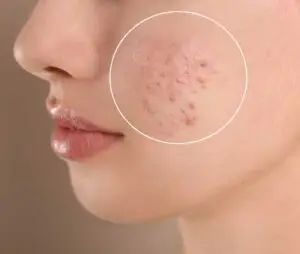
4. Soothes Skin Irritation, Redness, and Erythema
Niacinamide exhibits anti-inflammatory and wound healing properties. Topically applied niacinamide improves skin barrier function and moisture levels, reducing irritation and redness caused by detergents and soaps.

5. Treats Skin Barrier Impairments and Photodamage
Niacinamide improves keratinocyte differentiation and increases the synthesis of ceramides, free fatty acids, and cholesterol. This improves barrier function, reduces transepidermal water loss, and increases moisture levels, making it effective for treating photodamaged skin and conditions like atopic dermatitis.

How do you incorporate Niacinamide into your daily skincare routine?
Niacinamide is a well-known ingredient in skincare products, available in both oral and topical formulations. Oral formulations are recommended for inflammatory disorders and skin care. Topical formulations such as toners, moisturizers, serums, and face masks, have been used for the treatment of skin concerns such as acne, melasma, and pigmentation.

Incorporating niacinamide into your routine depends on your specific skincare concern and current regimen. The step at which you apply niacinamide depends on the type of product. If you have a niacinamide toner, serum, or moisturizer, you can use it in both your morning and evening routines. If it’s a face mask, you can use it once or twice a week.
Always finish your morning routine with sunscreen and be mindful of other ingredients in the product, as some may not be suitable for frequent use and might irritate your skin.
Conclusion
Niacinamide is a versatile and well-tolerated ingredient, making it a valuable addition to any skincare regimen. Whether you’re looking to smooth skin texture or reduce the appearance of wrinkles, niacinamide can help you achieve healthier, more radiant skin. With its wide range of benefits and compatibility with other skincare ingredients, it can elevate your skincare routine and deliver visible results.
So why wait? Integrate a niacinamide product, such as the BioBird face mask, into your daily routine to experience its full range of transformative benefits. As always, start gradually and pay attention to how your skin responds.
Frequently Asked Questions (FAQs)
1) What does niacinamide do for your skin?
Niacinamide is a miraculous skincare ingredient that can do wonders for your skin. It acts as an antioxidant, improves skin barrier function, reduces fine lines and wrinkles, decreases hyperpigmentation, reduces skin redness, and improves skin texture.
2) Is it okay to use niacinamide every day?
Yes, it is perfectly fine to use niacinamide every day. It is advisable to start by using it once a day or every other day to monitor your skin’s reaction before increasing the frequency.
3) What are the disadvantages of niacinamide on the face?
Niacinamide can be harmful to people with sensitive skin or pre-existing allergies. It may also cause irritation and redness if used in high concentrations. So, it is recommended to consult your dermatologist and use products with concentrations from 5-10%.
4) Can you use niacinamide with other ingredients?
Absolutely! Niacinamide works well with many other skincare ingredients, including AHAs, retinoids, ceramides, and vitamin C. Combining niacinamide with these ingredients can enhance radiance, even out skin tone, and provide additional protection against environmental damage.
5) What should not be mixed with niacinamide?
It is recommended not to mix niacinamide with alpha hydroxy acids (AHAs) and beta hydroxy acids (BHAs), as it can decrease the efficacy of both products and lead to irritation. If you want to include both products, apply these ingredients at different times of the day.





